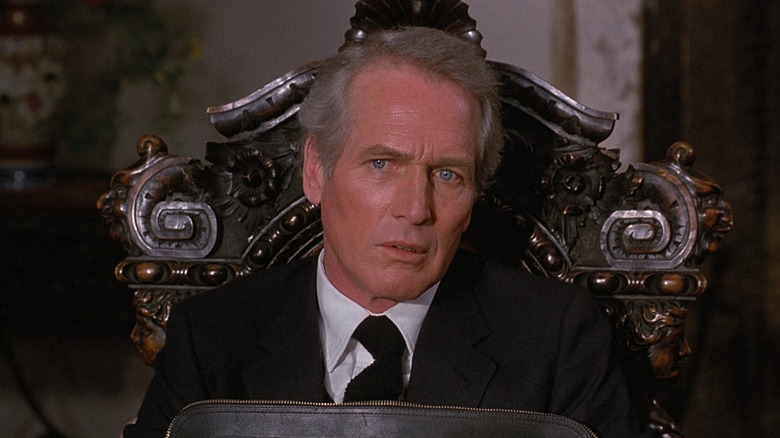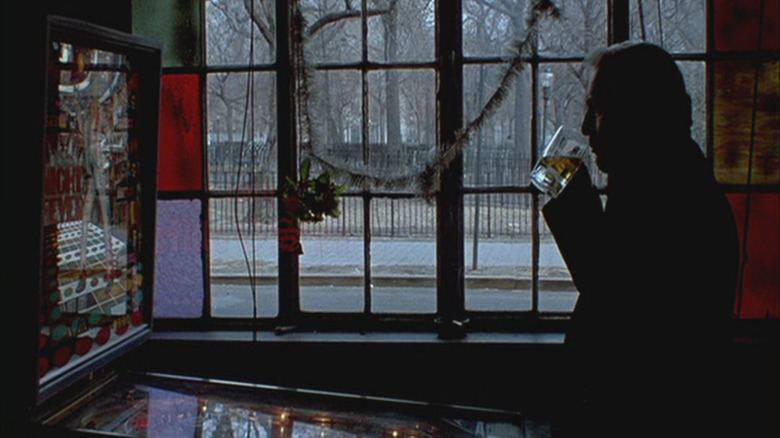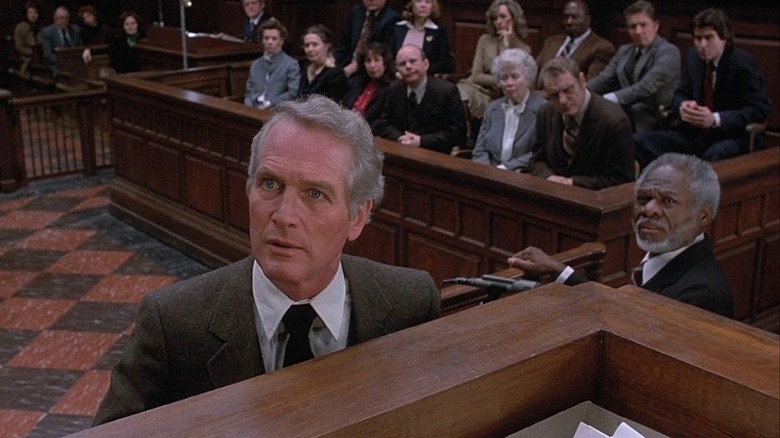Paul Newman Was Nominated For An Oscar For A Role Robert Redford Landed And Then Ghosted
Few screen duos hold such a popular place in American cinema than Paul Newman and Robert Redford, something pretty remarkable since they only made two films together. "Butch Cassidy and the Sundance Kid" and "The Sting" have become synonymous with screen chemistry and the pair were good friends in private, too, living as neighbors in Connecticut. Sadly, a third collaboration, "A Walk in the Woods," was abandoned when Newman passed away in 2008 (Redford would eventually star in the film opposite Nick Nolte). Perhaps surprisingly, the two legendary actors didn't compete for many roles, but there was a time when Newman stepped into a part vacated by Redford and earned an Oscar nomination for his efforts.
That role was Frank Galvin, an alcoholic attorney who takes on the Catholic church in Sidney Lumet's "The Verdict," a taut legal thriller based on Barry Reed's 1980 novel of the same name. Screenwriting duties were handled by playwright David Mamet, who had just switched to movies with the steamy remake of "The Postman Always Rings Twice." Several big names circled the juicy central role including William Holden, Dustin Hoffman, and Cary Grant, but Robert Redford came calling when the studio expressed dissatisfaction with Mamet's script and commissioned a re-write by Jay Presson Allen.
Riding high after winning his only competitive Oscar for "Ordinary People," Redford had plenty of clout and ordered further amendments from his chosen director, James Bridges, to soften the main character and make him more likeable. The producers tired of the actor trying to turn Galvin into a "Boy Scout" and his failure to show up on set, not to mention meeting with his regular collaborator Sydney Pollack behind their back after Bridges walked away from the project. Ultimately, Redford received his marching orders and Paul Newman was cast instead.
What happens in The Verdict?
Seedy Boston lawyer Frank Galvin (Paul Newman) is half-beaten before he even gets his big case in "The Verdict." Formerly an idealistic hotshot with a promising career ahead of him, he's now a divorced alcoholic who divides his time trawling funerals for clients and playing pinball in his local bar instead of reading case files. His free fall is interrupted when his old mentor Mickey Morrissey (Jack Warden) has pity and throws a no-brainer medical malpractice case his way. It involves a young woman who was left in a coma due to negligence by two esteemed doctors at a Catholic hospital, and the Archdiocese is happy to throw some money at the issue to make it go away.
All Galvin has to do is collect the check, take his cut, and make the lives of the patient's family easier. But a long-dormant sense of justice is awakened and Galvin decides to fight the case in court, leading the hospital's defense attorney Ed Concannon (James Mason) to mobilize his large legal team. Galvin quickly regrets his decision; low on confidence and facing a biased judge, his star witness vanishes and the replacement is easily discredited. But in the grand tradition of courtroom thrillers, Galvin rustles up a surprise witness at the last moment – but will their testimony be enough to convince the jury?
Lumet returned to the theme of justice throughout his career and "The Verdict" is something of a companion piece to "12 Angry Men." In both films, he treats the legal system as a vast unwieldy machine that is basically fit for purpose, but its effectiveness depends on the skill and motivations of those pulling the levers. Mamet's screenplay is far more cynical about the sway that money and power has over court rulings, however, setting up an understated underdog story with Newman on top form.
Why The Verdict is better with Paul Newman in the lead role
With Sidney Lumet taking over the director's chair, Paul Newman read both screenplays for "The Verdict" and favored David Mamet's harder-edged version. As a result, we got a mature and thoughtful film built around Newman's remarkably measured performance. The screen idol often did his most interesting work portraying flawed men, from irredeemable heels like the title character in "Hud" to the cheerfully sleazy Reggie Dunlop in "Slap Shot," and he brought all his skill to playing the dog-eared, booze-addled Frank Galvin. A lesser actor may have overplayed the part, but Newman doesn't go for grandstanding moments; he believably invests Galvin with years of weariness and desperation, making him a habitual loser who even receives victories with a slight intake of breath, as if each positive lifts a weight off his soul.
For all his fine qualities, Robert Redford was arguably a better superstar than an actor, and it's inconceivable that he would have brought so much gravitas to the part. Indeed, given his efforts to take the rough edges off the character while he was briefly attached to the film, "The Verdict" would have probably ended up very different in tone with him in the lead. By contrast, Newman was far more confident with taking risks and leaning into the more unpleasant aspects of the role, including fighting for a scene when Galvin angrily slaps a treacherous lover who he discovers is playing for the other team. It's quietly mesmerizing turn from Newman and he appropriately received his sixth Oscar nomination for Best Actor, losing out to Ben Kingsley in "Gandhi." After an Honorary Academy Award in 1986, he finally took home a golden statuette for reprising his role as "Fast Eddie" Felson in "The Color of Money." A fine performance, no doubt, but playing Frank Galvin was more deserving.


